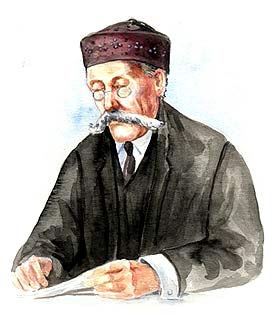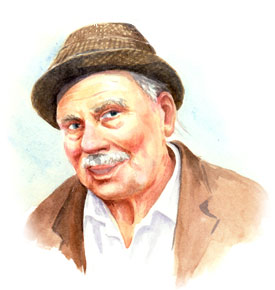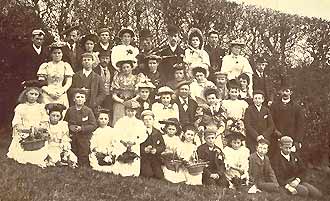|
The Principal Collectors of North East Music and Song
Gavin Greig -
Francis J. Child -
Hamish Henderson
|
Gavin Greig (1856 - 1914)
"One of the most successful and pertinacious researchers
that have explored the realm of ballad literature."
JMH
Gavin Greig, scholar, intellectual and tireless champion
of Buchan's culture and tradition, was born at Parkhill, Newmacher,
Aberdeenshire, on 10th February 1856. He was educated at Aberdeen
University and later became a teacher at Whitehill School,
by New Deer, where he remained until his death on 31st August,
1914.
In Greig's "Ballad Corner," a weekly feature in the local
newspaper, the Buchan Observer, he wrote about the songs and
singers of the North East, a subject close to the heart of
the young J.M.H. and perhaps the inspiration behind his devotion
to the collecting of music and song. Though Greig was a gifted
poet and playwright, many of which were published in the "Whistle
Binkie" collections, his fame rests on the folk song collection
he made with the Rev J. B. Duncan, 1848-1917. Regarded by
many as the greatest of its kind, the immense Greig - Duncan
collection was eventually published in an eight volume set.
|

Gavin Greig
1856 - 1914
|
|
|
The original cast of the New Deer production of Greig's
play Mains Wooin', a humorous tale of the trials and tribulations
of life in rural Buchan first performed in New Deer in 1894.
(Ritchie Collection)
Greig is seated near centre, wearing a bonnet.
Gavin Greig, JMH 1934 
|

Francis James Child
1855 - 1895
|
Francis J. Child (1825-1896)
Francis James Child's five volume work, The English and Scottish
Popular Ballads (1882-1898), is considered by many as the
"canon" of folk music.
He was born on February 1st, 1825, in Boston, Suffolk, United
States, the son of Joseph and Mary (nee James) Child. His
father, a sailmaker, could barely provide for his family let
alone afford the education the young Francis clearly deserved.
After a time at Boston Grammar School and later the English
High School, and through the generosity of Epes Sargent Dixwell
(the principal of the Boston Latin School who recognised Child's
genius) Child was able to enter Harvard. He graduated first
in his class and was offered a position in mathematics and
later in history and political economics.
Child published Four Old Plays and a loan from Jonathan I.
Bowditch (to whom the work was dedicated) enabled Child to
take a leave of absence from Harvard from 1849 - 1851 to study
English drama and Germanic philology in Europe, studying in
Berlin and Gottingen. In 1851 he was named the Boylston Professor
of Rhetoric and Oratory - a position he held for 25 years.
|
Throughout his tenure at Harvard he collected ballad books in
many languages and corresponded with scholars throughout the world.
Through his efforts the Harvard library came to house one of the
largest folklore collections in existence.

Hamish Henderson
1919 - 2002
|
Hamish Henderson (1919-2002)
Hamish Henderson, folklorist and poet, born November 11 1919;
died March 8 2002.
Henderson was born in Blairgowrie, Perthshire, in November,
1919, the son of an army officer and whose mother, Janet,
had spent the first world war as a nurse on the western front.
His early years were spent in a small cottage at the Spittal
of Glenshee.
During the Second World War he served in North Africa. Elegies
for the Dead in Cyrenaica (1948) chronicles that experience
- the drama and horror of battle set against the tedium of
military routine - and explores the moral implications of
war. Commissioned in 1941, he worked as an intelligence officer
in the Western desert, in Sicily and throughout mainland Italy.
Promoted to captain in 1943, he fought with the partisans,
captured and interrogated numerous prisoners, was mentioned
in dispatches, and personally accepted the surrender of Italy
from Marshal Graziani. He kept the signed document in his
pocket till his death.
|
Whilst in Italy he spent some time as a guest of the Olivetti
family - of typewriter fame - who introduced him to the portable
tape recorder. Henderson immediately saw its potential and returned
to Scotland with a mission. He would record for posterity the folk
music of Scotland. He suspected the tradition was still strong,
but what he found was better than he or anyone imagined. The great
songs and singers were there in their hundreds - in tinker tents,
bothies and stables, in miners' clubs, on fishing boats and in farmers'
kitchens. The second phase of Henderson's life had begun; he became
a folklorist and, in 1951, with Calum MacLean, the Gaelic scholar,
he established the School of Scottish Studies at the University
of Edinburgh. For many years he travelled around Scotland collecting
traditional songs and tales. When he met Jeannie Robertson in Aberdeen
in 1953 she was a little-known singer; Hamish Henderson was instrumental
in introducing her remarkable voice and rich store of traditional
song to a far wider public.
Over the next 40 years, Henderson made distinguished contributions
to folk scholarship and, when he retired from teaching in 1987,
the school allowed him to retain his room in George Square, where
he continued his work almost until his death.
His publications include Alias MacAlias: Writings on Song, Folk
and Literature (1992), The Armstrong Nose: Selected Letters (1996)
and Collected Poems and Songs (2000).
|




